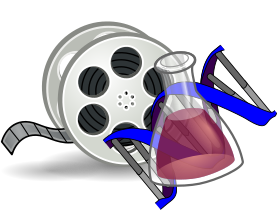
Adding multimedia files to Wikipedia articles has never become a common practice as adding images, although there are topics that would clearly benefit more from having video and audio files. Many articles on scientific phenomena involving physical and chemical changes can not be properly explained through the staticity of images and require dynamicity that can be provided with videos. Furthermore, digital learning in education is increasing and it has especially gained momentum during the COVID-19 pandemic when many educational systems switched to online learning. The latter underlines the importance of educational resources in digital form.
In order to address the foregoing issues, Shared Knowledge in collaboration with Ss. Cyril and Methodius University of Skopje started a project known as Wikiexperiments with the goal of recording and uploading free high-definition videos of scientific experiments for the purposes of illustrating important scientific concepts and phenomena across the Wikimedia projects. After a year-long break, the project that began in September 2015 continued with new recordings produced throughout 2020 that brought the total number of physics and chemistry experiments recorded so far up to 90.
Economic motivation and background
Scientific experiments have found their place in the curriculum of virtually every education institution around the world as powerful resources in the process of learning. In its usual form, an experiment is carried out in a venue with limited capacity and limited access, and its performance requires time and bears some cost for preparation, which implies that it would be enormously costly and time-consuming to allow every single person in the world to view it as many times as desired. From an economic viewpoint, the latter tells that an experiment is chiefly rivalrous and partly excludable good. In plain language, rivalry means that an experiment performed in front of a limited audience prevents anyone from viewing it, while excludability means that its access is limited to those who are able to pay to view it. For instance, if a single performance of an experiment costs $10 and it can be carried out in a venue that accommodates 100 people at most, a simple calculation yields that approximately 78 million reiterations costing $780 million will be needed to satisfy the entire world population only once; in a similar way, if an educational institution charges $10 to enroll to a course that includes experiments in its outline, the entire world population would have to spend a total of around $78 billion to view an experiment only once.
The ultimate goal in the whole story is to transform the experiments from their usual form into another so that they become public goods — that is, non-rivalrous and non-excludable at the same time — and as such can be freely used by anyone infinitely many times at zero cost. And this goal is mostly achieved with the Wikiexperiments whose two defining characteristics are being video files and free contents. As a video file, an experiment is performed only once while being recorded and it can be replayed infinitely many times at an almost zero marginal cost, making it a non-rivalrous good. As a free content, an experiment can be accessed by anyone, making it an excludable good. Nevertheless, excludability may still prevail due to the concept of global digital divide, that is the gap between people from different regions, especially from developing countries in Africa and Asia, who have uneven access to Internet. Numerous programmes and initiatives aimed at reducing this gap have been started, including Kiwix as a fre and open-source offline web browser allowing access to the Wikimedia projects.
How is the project carried out?
The project is run by Shared Knowledge in collaboration with Prof. Oliver Zajkov from the Institute of Physics and Prof. Vladimir Petruševski from the Institute of Chemistry at Ss. Cyril and Methodius University of Skopje. The choice of topics with text descriptions and all the preparatory work — hiring a venue, supply of reagents and setting up equipment — are done by the academic staff. On the other hand, the production and post-production of the video files is Shared Knowledge’s responsibility. Efforts have also been made to get students involved in the process, in particular by training them to edit Wikipedia articles on the topics covered with the recorded experiments.
Since the start of the project, four instalments of recording sessions have taken place: in September 2015 with 25 physics experiments, in the period June–October 2016 with 20 chemistry experiments, in January 2020 with 22 chemistry experiments and in the period October–December 2020 with 23 physics experiments. All recorded video files have been uploaded to a specific category on Wikimedia Commons under CC-BY-SA 4.0. The video files contain concise and detailed descriptions in English that explain the recorded content using scientific language and notation. They have been deliberately produced voiceless in order to enable adding subtitles in the desired language.
Digital library down the line
Considering that a total of several hundreds scientific experiments have been identified, the project is expected to continue in full swing in the upcoming period with the pace of recording largely depending on the partnering university and the availability of the involved staff. As the number of recorded experiments grows and the range of covered topics widens, one consideration down the line is to create a free digital library of systematically organised content as a novel open educational resource. The structure of the digital library will be aligned with the curriculum and its goal will be to further ease the process of learning in education.

Can you help us translate this article?
In order for this article to reach as many people as possible we would like your help. Can you translate this article to get the message out?
Start translation